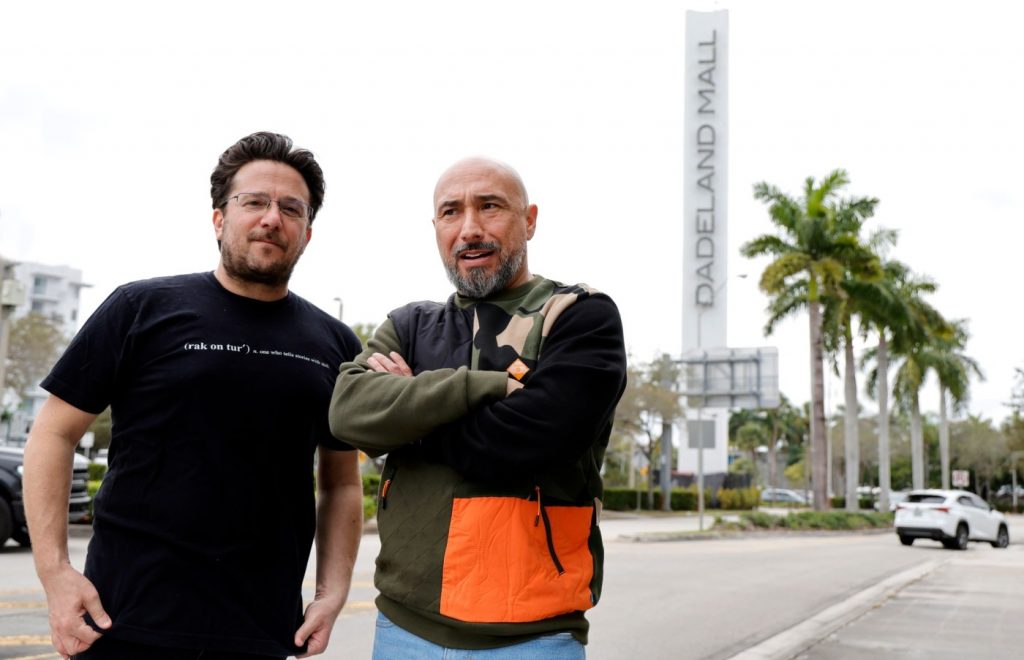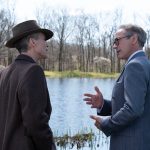How does the real-life Colombian godmother of cocaine, Griselda Blanco, measure up to her portrayal on Netflix’s popular, South Florida-set show “Griselda”?
The answer, if you ask Miami filmmaker Billy Corben, is complex enough to fill a seven-episode podcast.
“The Real Griselda,” which premiered last week on audio platforms and on YouTube, is cohosted by Corben and Blanco’s youngest and last-surviving son, Michael Corleone Blanco, and is billed as a rebuttal against the TV show starring Sofia Vergara.
Griselda Blanco’s son, Michael Corleone Blanco, in front of Miami’s Dadeland Mall, site of a daytime submachine gun attack in 1979 that shocked South Florida. (Carline Jean/South Florida Sun Sentinel)
That’s because the truth about Griselda Blanco — the 200-plus murders attributed to “The Godmother,” her notorious rise and downfall in a drug trade dominated by men — is spectacular on its own without needing extra embellishment, Corben tells the South Florida Sun Sentinel.
“‘Griselda’ is gonzo Cocaine Cowboys fan fiction,” Corben says. “It doesn’t really come close to explaining how compelling and violent and complicated Griselda’s life was, much less her family’s.”
“On ‘The Real Griselda,’ we’re not just talking about the show,” he says. “We’re talking about what really happened.”
No one has arguably drawn more attention to South Florida’s chaotic Cocaine Cowboys era than Corben and Rakontur, the film studio he cofounded with Alfred Spellman and David Cypkin that has produced four documentaries (including one for Netflix) and a play (at Miami Beach’s Colony Theatre).
To pull it off, filmmakers relied on newspaper clippings and candid jailhouse interviews with known traffickers such as Jon Roberts, Mickey Munday and Jorge “Rivi” Ayala, along with case detectives and journalists. Starting with 2006’s documentary “Cocaine Cowboys,” their pulpy, frenetic films unraveled the cocaine-smuggling boom of the late 1970s and early 1980s: Colombian narcos partying in Miami nightclubs; stash houses in Fort Lauderdale; and violent shootouts in Kendall. (In a January New York Times feature, Vergara, who plays the criminal billionaire in the Netflix treatment, credited “Cocaine Cowboys” as her reason for making an adaptation of “Griselda.”)
At the center of it all stood Blanco, whose brazen ruthlessness plunged South Florida into years of drug-fueled violence. Police branded her “La Madrina” of the Colombia cartel, but Blanco earned her other nickname, “The Black Widow,” for allegedly killing her husbands and lovers. Assassins eventually gunned her down outside a butcher shop in Medellín, Colombia, in 2012.
Also involved in Blanco’s business was her youngest son, Michael Corleone Blanco — yes, he’s named after a character in “The Godfather” — who bore witness to his mother’s blood-soaked style of street vengeance.
“Billy and I, we’re experts on Griselda Blanco,” he says. “I fill in the gaps on the cases, and I tell never-before-told gems. It’s a lot of shocking stuff.”
In making “The Real Griselda” podcast, Corben says he aimed to set the record straight, episode by episode, to show what Netflix got wrong — and right — about Blanco.
“I thought there was a great story to tell about this multigenerational crime family that Netflix wasn’t telling,” Corben says.
So what’s fact and fiction on Netflix’s “Griselda,” according to Corben and Michael Blanco? Below are six scenes the pair discuss in the limited series.
Sofia Vergara as Griselda Blanco in Netflix’s “Griselda.” (Elizabeth Morris/Netflix/TNS)
SCENE: Griselda Blanco becomes the first Miami drug dealer to market cocaine directly to rich white people.
Fact or fiction? Fiction, Corben argues. Cocaine was ubiquitous in discotheques across Miami by the late 1970s, when Blanco relocated from Colombia. (Miami also marks Blanco’s second trip to the United States, after a stint in the early 1970s living in New York City.) “She might as well have discovered electricity,” Corben quips. “Come on. It’s 1978. Half of disco culture was fueled by cocaine and quaaludes in the U.S. and Europe, and Griselda’s looking around, discovering that rich white people like cocaine?”
SCENE: Upon arriving in Miami, Blanco struggles to sell a single brick of cocaine.
Fact or fiction? Fiction, Corben says. By the time she arrived in South Florida, “Griselda was already a fugitive in two countries and was one of the biggest players in the drug industry. It’s 1978, so it’s funny that she struggles so much to sell a brick of cocaine. She could’ve sold it at Miami airport, it was so in demand.”
SCENE: Blanco is presented as having two husbands, Alberto Bravo and Darío Sepúlveda, both of whom she murders.
Fact or fiction? True, with one caveat: Blanco actually had three husbands, and the first — Carlos Trujillo — was left out of the Netflix series. Based on interviews with cartel members, Corben says Trujillo wasn’t murdered and “actually died of hepatitis in New York.” With Blanco’s second husband, Bravo, “it was a marriage of convenience having to do with their legal status in the U.S.,” he says. “The show’s idea that this started as a passionate love affair is not true.” Bravo was shot dead by Blanco in Colombia. While Blanco wasn’t charged for the murder of her third husband, hitman Darío Sepúlveda (Michael Blanco’s father), former associates have said she ordered the hit.
SCENE: Blanco orders the Dadeland Mall shootout in retaliation against her business partner, German Panesso, for betraying her and joining forces with Miami drug kingpin Rafa Salazar.
Fact or fiction? It’s half-true. The daytime submachine gun attack at Dadeland Mall in Miami was very real and shocked South Florida in 1979, and though Panesso and his bodyguard died, Panesso “was only one of the targets,” Corben says. “It was related to a whole other slew of s—. The series says the attack marked the first shots in the drug war, but Blanco had ordered other public shootouts before that, including on the Florida Turnpike.”
SCENE: Blanco is destined for Florida’s Death Row until a phone-sex scandal taints the murder case.
Fact or fiction? True. The prosecution’s murder case against Blanco seemed all but assured until Jorge “Rivi” Ayala, her former associate and the case’s star eyewitness, engaged in sexually explicit phone conversations with secretaries from the Miami-Dade State Attorney’s Office. The scandal undermined Ayala’s credibility and Blanco avoided the death penalty.
SCENE: Blanco first meets her future drug associates while living in Miami.
Fact or fiction? Fiction, Corben says. While “Griselda” makes it appear like she arrived in South Florida with nothing, the Godmother was already a notable cocaine dealer and linked to the Medellin Cartel, which helped her gain a foothold in the Magic City. “She grew up with Rafa Salazar and Papo Mejia in Colombia. She knew them. And she didn’t just meet (her bodyguard) Chucho Castro in Miami,” Corben says.
‘Eyewitness to a lot of mayhem’
During a phone interview with the South Florida Sun Sentinel, Michael Corleone Blanco says he wanted to participate in the podcast to demystify rumors about his mother, but also to protect his family’s intellectual property, of which he has a financial stake.
“The podcast goes way deeper in terms of the data and the timelines,” says Michael Blanco, 45, who was charged with cocaine trafficking in 2012 and starred on the VH1 reality series “Cartel Crew” for three seasons from 2019 to 2021.
On Jan. 17, he sued Vergara and Netflix in Miami-Dade County court to try to block the release of “Griselda,” seeking damages in excess of $50,000. In the interview, he declined to answer pointed questions about his stance on the Netflix show, citing the ongoing litigation.
Instead, he directs people to buy his recently published memoir, “My Mother, The Godmother, and The True Story of Michael Corleone Blanco, the Son of Griselda Blanco.”
His opinions, however, are far less filtered on “The Real Griselda” podcast. During the debut episode, he says he liked how the series captured the bond between his mother and her four children. “That’s probably it (about ‘Griselda’) that I liked. Some stuff was just far from accurate,” he says.
Michael Corleone Blanco says he wanted to participate in the podcast to demystify rumors about his mother and protect his family’s intellectual property. (Carline Jean / South Florida Sun Sentinel)
To those who may think he was too young to remember his family’s past, Corben says, “I don’t think he was ever bull——–” … He’s recounting versions of events that were told to him, but from his mother and hitmen who were there. Could they lie to him? It’s possible. But he was an eyewitness to a lot of mayhem.”
Late in the podcast series, Michael Blanco shares one vivid memory as a 5-year-old. His father, Sepúlveda, had escaped to Colombia with him, and the two were riding together in a car when police pulled them over.
When Sepúlveda ran, they opened fire as his son watched.
“(Michael Blanco) starts crying and he starts leaving the studio. This guy, who has lost 22 members of his family to this business, to the narco trade,” Corben recalls. “His father’s murder just didn’t happen like it happened in the series, he said, because he was there.”
“Our universe — the Blanco family universe — is so complex and so legendary, it should be shown respect,” Michael Blanco adds. “I think the story deserved (to show) a little more.”
New episodes of “The Real Griselda” will be released Feb. 12, Feb. 14 and Feb. 16 on all podcast platforms and on YouTube.com/@rakonturmiami/videos.


